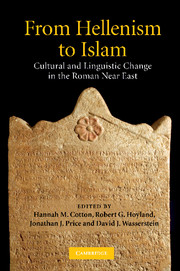Book contents
- Frontmatter
- Contents
- List of figures
- List of tables
- List of contributors
- Preface
- List of abbreviations
- Introduction: documentary evidence, social realities and the history of language
- Part I THE LANGUAGE OF POWER: LATIN IN THE ROMAN NEAR EAST
- Part II SOCIAL AND LEGAL INSTITUTIONS AS REFLECTED IN THE DOCUMENTARY EVIDENCE
- Part III THE EPIGRAPHIC LANGUAGE OF RELIGION
- 7 ‘Languages’ and religion in second- to fourth-century Palestine: in search of the impact of Rome
- 8 The epigraphic habit and the Jewish diasporas of Asia Minor and Syria
- 9 Religion and language in Dura-Europos
- Part IV LINGUISTIC METAMORPHOSES AND CONTINUITY OF CULTURES
- Part V GREEK INTO ARABIC
- Index
9 - Religion and language in Dura-Europos
Published online by Cambridge University Press: 01 March 2010
- Frontmatter
- Contents
- List of figures
- List of tables
- List of contributors
- Preface
- List of abbreviations
- Introduction: documentary evidence, social realities and the history of language
- Part I THE LANGUAGE OF POWER: LATIN IN THE ROMAN NEAR EAST
- Part II SOCIAL AND LEGAL INSTITUTIONS AS REFLECTED IN THE DOCUMENTARY EVIDENCE
- Part III THE EPIGRAPHIC LANGUAGE OF RELIGION
- 7 ‘Languages’ and religion in second- to fourth-century Palestine: in search of the impact of Rome
- 8 The epigraphic habit and the Jewish diasporas of Asia Minor and Syria
- 9 Religion and language in Dura-Europos
- Part IV LINGUISTIC METAMORPHOSES AND CONTINUITY OF CULTURES
- Part V GREEK INTO ARABIC
- Index
Summary
Dura-Europos was rich in gods and rich in languages. The unique religious and linguistic situation of this fortress town on the Middle Euphrates reflected its vicissitudes. Founded as the Macedonian colony Europos on a plateau overlooking the river, Dura was under Parthian control (with a brief Roman interlude in 116/7 CE) from the late-second century BCE until 165 CE. Lucius Verus' campaigns brought in the Roman troops who, nearly a century later, would be defeated by the Sasanians in 256 CE. Throughout most of the Parthian and Roman phases a large Palmyrene contingent was to be found in the town too. The now legendary excavations from the 1920s and 1930s by Yale University and the French Academy of Inscriptions and Belles-Lettres revealed a wide spectrum of pagan cults, coming from different spheres of influence, in addition to a synagogue (famous because of its unique murals, with their illustrations of scenes from the Hebrew Scriptures) and a Christian house church. Graffiti and inscriptions, as well as the remains of writing on more perishable material, show an even more remarkable diversity of languages and dialects in use, with the classical languages supplemented by Aramaic (including Palmyrenean, Hatrean and Syriac), Hebrew, Parthian and Middle Persian, and the ancient north Arabian dialect known as Safaitic. Though not one of the grand Levantine cities, Dura-Europos was no marginal outpost either, and the abundance of archaeological findings makes it potentially our best case study for social and religious life in a normal Near Eastern small town under the early and high Empire. So far, however, neither the religious life nor the language situation has received the attention that has long been due.
- Type
- Chapter
- Information
- From Hellenism to IslamCultural and Linguistic Change in the Roman Near East, pp. 235 - 254Publisher: Cambridge University PressPrint publication year: 2009
- 9
- Cited by



